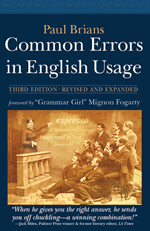The examples below are set off in order to avoid confusion over the use of single and double quotation marks.
There are many ways to go wrong with quotation marks. They are often used ironically:
She ran around with a bunch of “intellectuals.”
The quotation marks around “intellectuals” indicate that the writer believes that these are in fact so-called intellectuals, not real intellectuals at all. The ironic use of quotation marks is very much overdone, and is usually a sign of laziness indicating that the writer has not bothered to find the precise word or expression necessary.
Advertisers unfortunately tend to use quotation marks merely for emphasis:
“FRESH” TOMATOES
59 CENTS A POUND
The influence of the more common ironic usage tends to make the reader question whether these tomatoes are really fresh. Underlining, bold lettering, all caps—there are several less ambiguous ways to emphasize words than placing them between quotation marks.
In American usage, single quotation marks are used normally only for quoted words and phrases within quotations.
Angela had the nerve to tell me “When I saw ‘BYOB’ on your invitation, I assumed it meant ‘Bring Your Old Boyfriend.’”
British usage changed during the last century to reverse this relationship, with single quotation marks being standard and double ones being used only for quotations within quotations. (The English also call quotation marks “inverted commas,” though only the opening quotation mark is actually inverted—and flipped, as well.) However, usage in the UK is shifting toward the US pattern, (see, for instance, The Times of London); though the printing of fiction tends to adhere to the older British pattern, where US students are most likely to encounter it.
Single quotation marks are also used in linguistic, phonetic, and philosophical studies to surround words and phrases under discussion; but the common practice of using single quotation marks for short phrases and words and double ones for complete sentences is otherwise an error.
Block quotations like this should not be surrounded by any quotation marks at all. (A passage this short should not be rendered as a block quotation; you need at least three lines of verse or five lines of prose to justify a block quotation.) Normally you should leave extra space above and below a block quotation.
When quoting a long passage involving more than one paragraph, quotation marks go at the beginning of each paragraph, but at the end of only the final one. Dialogue in which the speaker changes with each paragraph has each speech enclosed in its own quotation marks.
Titles of books and other long works that might be printed as books are usually italicized (except, for some reason, in newspapers); but the titles of short poems, stories, essays, and other works that would be more commonly printed within larger works (anthologies, collections, periodicals, etc.) are enclosed in quotation marks.
There are different patterns for regulating how quotation marks relate to other punctuation. Find out which one your teacher or editor prefers and use it, or choose one of your own liking, but stick to it consistently. One widely accepted authority in America is the Chicago Manual of Style, whose guidelines are outlined below. English, Canadian, Australian and other writers in British-influenced countries should be aware that their national patterns will be quite different, and variable.
In standard American practice, commas are placed inside quotation marks:
I spent the morning reading Faulkner’s “Barn Burning,” which seemed to be about a pyromaniac.
In American usage periods are also normally placed inside quotation marks (with the exception of terms being defined, see above). Colons and semicolons, however, are preceded by quotation marks.
If the quoted matter ends with a question mark or exclamation point, it is placed inside the quotation marks:
John asked, “When’s dinner?”
But if it is the enclosing sentence which asks the question, then the question mark comes after the quotation marks:
What did she mean, John wondered, by saying “as soon as you make it”?
Similarly:
Fred shouted, “Look out for the bull!”
but
When I was subsequently gored, all Timmy said was, “This is kinda boring”!
In British usage, all punctuation marks normally go outside the single quotation marks, though usage does vary in the UK.
It is unfortunately true that many standard character sets—including ASCII and basic HTML—lack true quotation marks which curl to enclose the quoted matter, substituting instead ugly “inch” or “ditto” marks. If you are writing HTML for the Web, you need to turn off the “smart quotes” feature in your word processor which curls quotation marks and apostrophes. Leaving curled quotation marks and apostrophes in text intended for the Web causes ugly gibberish which will make your writing hard to read.
If you would like to include proper curled quotation marks and apostrophes in your HTML code you can write “ (curled double open quote), ” (curled double close quote), ‘ (curled single open quote), and ’ (curled close quote). Most contemporary browsers can properly interpret these codes, though they used to cause trouble for people using older browser versions.
See also apostrophes.
Back to list of errors

BUY THE BOOK!
